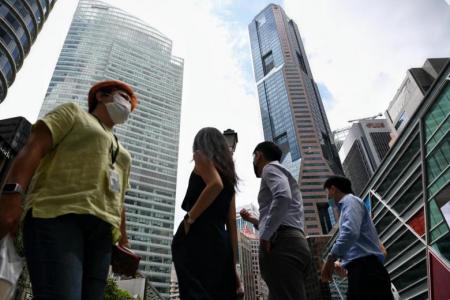5 points from MOF's report on the impact of key Covid-19 Budget measures
Fiscal and public health measures adopted by Singapore to address the Covid-19 crisis have enabled the country to mitigate the economic and health impact ofthe pandemic.
Here are the key highlights of a 58-page report by the Ministry of Finance (MOF) on Thursday (Feb 17), which assessed the effects of key Covid-19 Budget measures introduced in 2020 and 2021:
1. Economic and job losses averted
TheBudget measures, aided by accommodative monetary policy, propped up the economy. Without them the real domestic product would have shrunk 10.7 per cent 2020. Instead it shrank just 4.1 per cent. The measures also saw real GDP grow by 7.6 per cent in 2021, while without them it would have grown just 6.8 per cent.
Also, without fiscal and monetary policy support, it is estimated that the resident unemployment rate would have hit 6.1 per cent in 2020 and 7.5 per cent in 2021.
This would have been 2 percentage points higher than the actual rate in 2020 and 4 percentage points than what was seen in 2021.
2. Vaccine rollout, public health measures prevented higher death toll
Singapore's public health measures and vaccination efforts are estimated to have averted about 8,000 deaths due to Covid-19 between Aug 1 and Dec 31 last year - during the peak of Delta variant infections.
The measures taken also helped to prevent 33,000 severe infection cases and 112,000 hospitalisations, according to the Ministry of Health's projections.
Having one of the highest vaccination rates in the world has also enabled Singapore to keep its Covid-19 death rate low.
The Republic reported about 15.7 Covid-19 deaths per 100,000 population - on par with other countries with high vaccination rates such as South Korea and Japan, and lower than other developed countries with lower vaccination rates like Germany and the United States.
3. Jobs Support Scheme also helped preserve wages
A series of deeper studies were conducted by MOF, Ministry of Trade and Industry and Ministry of Manpower to measure the impact of specific schemes.
In particular, the Jobs Support Scheme (JSS) was found to have saved an estimated 165,000 local jobs for the period between March and December 2020.
The scheme, under which a total of $28 billion was disbursed from April 2020 to Dec 2021, also helped to preserve wages.
The impact of other initiatives to provide training and employment opportunities was alsolooked at.
As at end-October 2021, more than 166,300 jobs and skills opportunities under the SGUnited Jobs and Skills Package were filled, with the majority being job placements.
The Temporary Bridging Loan programme was also found to have alleviated financial distress across firms of all sizes and supported employment in smaller companies with 50 or fewer employees.
4. Economic scarring was prevented
Financing schemes and wage supporthelped to ensure that capabilities were retained even during the period of weak demand. This has allowedfirms to maintain a strong base to better seize opportunities for recovery when demand returns.
Singapore also turned to its past reserves rather than debt to fund its fiscal support measures, unlike most governments around the world.
The design of Covid-19 schemes for businesses also helped to contribute to a limited increase in corporate debt and stable levels of non-performing loans through 2020 and 2021.
5. Employment rate went up
Resident employment expanded despite the challenges of Covid-19, with the resident employment rate increasing 2 percentage points between 2019 and 2021. The resident labour force participation rate also increased during this period.
This was as workers were supported in retaining their capabilities and transiting to new jobs.
Job prospects of graduates from institutes of higher learning in 2020 also remained about the same as their peers who graduated in 2018 and 2019, with the help of traineeship opportunities.
The unequal impact of the pandemic was also lessened, through social support which was skewed towards lower-income households.
Get The New Paper on your phone with the free TNP app. Download from the Apple App Store or Google Play Store now


